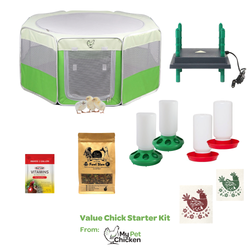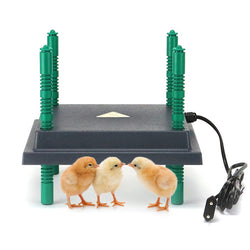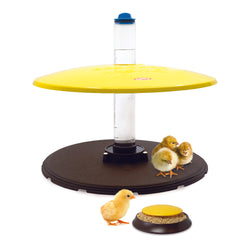How do I help a chicken with vent prolapse?
Back to blog
Also called "blowout", vent prolapse is a condition in which the vent becomes inverted and a portion of it protrudes outside the bird's body. Thankfully, in most cases, it is treatable if detected early and the bird can recover completely.
Vent prolapse is common in some breeds and crosses, especially those prone to fatness (such as meat breeds). Vent prolapse itself is not contagious, but the underlying issues causing the prolapse (obesity, photostimulation, etc.) can be. In addition, birds prone to cannibalization of a flock member's prolapsed vent may develop other types of cannibalization, like feather picking. Vent prolapse is not communicable to humans or to other chickens, but a bird may develop chronic problems with prolapse.
In general, there are no other conditions, illnesses and/or diseases that mimic the symptoms of prolapsed vent.
The same signs associated with pain: lack of appetite, lethargy, huddling with fluffed up feathers.
Cardinal or diagnostic signs -
Parts of the internal reproductive tract protrude from the vent; if the bird has been cannibalized by flock mates, the vent may also be bloody or torn.

With excellent care, this chick with a difficult case of prolapsed vent recovered completely.
Photo courtesy: Jennifer from Tennessee
In chicks, prolapsed vent can be caused by cleaning stuck poo when treating pasted vent, getting squished under other chicks, straining too much for some reason (heat, constant cheeping, etc.), or sometimes rough handling by very young children.
In chicks, clean pasted vent carefully, provide enough space and the proper temperature under the heater for your chicks so they don't crowd one another or overheat, and carefully monitor small children when they are handling young chicks to make sure they are not too rough.
Home treatment - If you see portions of your hen�s cloaca protruding through her vent, please be sure to separate her, as she may be a target of pecking/cannibalization. Withhold feed--at least temporarily. While this sounds cruel, withholding feed for a day or two can cause a break in laying for your hen which can give her stressed vent/reproductive tract a much-needed break. If you do withhold feed, it can be a good idea to provide a vitamin supplement in her water in case the problem is caused or exacerbated by a nutritional deficiency.
You can don a latex or non-latex glove, and lubricate with petroleum jelly or an antibiotic ointment (be sure the ointment does not contain painkillers ending in -caine--they are not good for chickens). Use a finger to gently push the protrusion back inside the vent. Preparation H can help a small prolapse. If the prolapse has been pecked or �picked out,� it�s best to consult a vet. Do not treat the pain from a picked vent with an aspirin solution, either: that can thin the blood and cause additional bleeding. Consult a vet if you think your hen needs treatment for pain.
Veterinary care - A veterinarian can repair any damage done that has occurred to your hen�s vent due to prolapse and/or pickout. A veterinarian can also better handle larger prolapses, which may resist remaining inside the hen�s body. Finally, he or she can prescribe appropriate pain control and antibiotics to prevent or treat infection.
Recovery - Recovery depends on the extent of the prolapse and any pecking damage. However, the problem can recur, so a hen who has experienced a prolapse should be monitored regularly for problems.
Vent prolapse is common in some breeds and crosses, especially those prone to fatness (such as meat breeds). Vent prolapse itself is not contagious, but the underlying issues causing the prolapse (obesity, photostimulation, etc.) can be. In addition, birds prone to cannibalization of a flock member's prolapsed vent may develop other types of cannibalization, like feather picking. Vent prolapse is not communicable to humans or to other chickens, but a bird may develop chronic problems with prolapse.
In general, there are no other conditions, illnesses and/or diseases that mimic the symptoms of prolapsed vent.
Signs and symptoms of vent prolapse
General signs -The same signs associated with pain: lack of appetite, lethargy, huddling with fluffed up feathers.
Cardinal or diagnostic signs -
Parts of the internal reproductive tract protrude from the vent; if the bird has been cannibalized by flock mates, the vent may also be bloody or torn.

With excellent care, this chick with a difficult case of prolapsed vent recovered completely.
Photo courtesy: Jennifer from Tennessee
Causes of vent prolapse
It�s natural for the reproductive tract to slightly evert during laying, but if it doesn�t retract back into the vent, the problem is called prolapse. Vent prolapse is an issue that can happen to any hen in your flock, especially young hens who�ve just begun laying and have passed an egg too large for their age/size, or older hens who�ve lost smooth muscle tone. It can happen in hens with nutritional deficiencies, particularly calcium or magnesium, as those nutrients affect smooth muscle function. It happens most often to breeds prone to obesity, hens without enough space to properly exercise and forage, and hens exposed to excessive light year round (particularly in commercial situations where factory farms want to stimulate early laying).In chicks, prolapsed vent can be caused by cleaning stuck poo when treating pasted vent, getting squished under other chicks, straining too much for some reason (heat, constant cheeping, etc.), or sometimes rough handling by very young children.
Vent prolapse prevention, treatment, and recovery
Prevention - Provide proper nutrition for your birds. Avoid adding light to the coop at all, but at least until young birds have been laying for a month or two. Provide plenty of space in the run for your hens to be able to exercise. (In the case of a small tractor-style coop, be sure to move it daily to fresh pasture to encourage your hens to be active in their space. Avoid breeds and crosses prone to obesity, such as Rock-Cornish crosses. Limit high calorie treats if your birds are overweight.In chicks, clean pasted vent carefully, provide enough space and the proper temperature under the heater for your chicks so they don't crowd one another or overheat, and carefully monitor small children when they are handling young chicks to make sure they are not too rough.
Home treatment - If you see portions of your hen�s cloaca protruding through her vent, please be sure to separate her, as she may be a target of pecking/cannibalization. Withhold feed--at least temporarily. While this sounds cruel, withholding feed for a day or two can cause a break in laying for your hen which can give her stressed vent/reproductive tract a much-needed break. If you do withhold feed, it can be a good idea to provide a vitamin supplement in her water in case the problem is caused or exacerbated by a nutritional deficiency.
You can don a latex or non-latex glove, and lubricate with petroleum jelly or an antibiotic ointment (be sure the ointment does not contain painkillers ending in -caine--they are not good for chickens). Use a finger to gently push the protrusion back inside the vent. Preparation H can help a small prolapse. If the prolapse has been pecked or �picked out,� it�s best to consult a vet. Do not treat the pain from a picked vent with an aspirin solution, either: that can thin the blood and cause additional bleeding. Consult a vet if you think your hen needs treatment for pain.
Veterinary care - A veterinarian can repair any damage done that has occurred to your hen�s vent due to prolapse and/or pickout. A veterinarian can also better handle larger prolapses, which may resist remaining inside the hen�s body. Finally, he or she can prescribe appropriate pain control and antibiotics to prevent or treat infection.
Recovery - Recovery depends on the extent of the prolapse and any pecking damage. However, the problem can recur, so a hen who has experienced a prolapse should be monitored regularly for problems.



